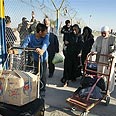
U.S.: Implement convoy agreement
Following Netanya bombing, PM decides to delay implementation of convoy agreement allowing Palestinians to move in protected convoys between Gaza, West Bank; U.S. trying to mediate in order to prevent expected political crisis
The most serious disagreement focuses on Israel's decision not to allow the passage Palestinian convoys between Gaza and the West Bank following the bombing.
Walsh met with Prime Minister Ariel Sharon and with Foreign Minister Silvan Shalom on Thursday in order to discuss the issue. On Friday he met with Defense Minister Shaul Mofaz, and on Saturday he met senior officials in the Palestinian Authority.
Following a security consultation after Monday's bombing, Sharon decided not to allow the passage of guarded Palestinian convoys between Gaza and the West Bank, which was planned to begin on December 15 as had been agreed upon in the crossings agreement.
'Israel exposed to deadly terror'
Walsh and the Palestinians demand that Israel implement the convoy route on the date agreed in the crossings agreement. Israel, however, has refused to do so, claiming that the Palestinian Authority has not met its commitment to fight terror.
"We are exposed to deadly terror coming from the West Bank, like the suicide attack in Netanya. In such a reality we are not ready to move forward and implement the crossings agreement, also on the issue of the convoys," government officials said.
The Americans plan to continue their mediation efforts until Thursday. Israel has asked to see the Palestinian Authority detaining wanted Islamic Jihad members and preventing the firing of Qassam rockets at Israel.
The Palestinians will be required to do so immediately, otherwise Israel will not ease restrictions on the Palestinians and will not implement the convoy agreement.
Simultaneously, defense establishment officials have criticized the Palestinians' work in the Rafah crossing. One of the problems was that online information about the people entering the crossing was not transferred to Israel, contrary to the agreement signed following Rice's pressure.
At first, the problem was that the images of people entering the Rafah crossing from Egypt to the Gaza Strip were only transferred 15 minutes later. In the past few days the delay was minimized to less than five minutes.
'Entry of al-Qaeda members'
The more serious problem from Israel's point of view was, according to aides of Mofaz, "the feeling that the Palestinians are fooling us with the names and the details of the people entering."
"We have information about al-Qaeda members and people from the black list of the Palestinian terror entering the crossing from Egypt to the Gaza Strip," Defense Ministry officials said.
"In light of the feeling that the Palestinians are playing with us and are not meeting their commitments to the crossings agreement mediated by the secretary of state, we said that we plan to reexamine what is happening in the Karni and Erez crossings," the officials added.
"All the reports as if Mofaz is threatening to impose an economic closure on the Palestinian Authority, which were published in the Israeli and global media, are not true. The defense minister will examine the issue and decide whether to upgrade the security checks in the Karni and Erez crossings in light of the security threat on Israel," they concluded.










